Learning a new language is easier than ever, but choosing the right app can be confusing. Babbel and Busuu are two of the most trusted, structured platforms — yet they teach in very different ways. Before you commit, here’s a quick look at how they compare and which one fits your learning style best.
TL;DR: Babbel vs Busuu
Babbel is best if you want structured, grammar-focused lessons with real-life dialogues in a clean, easy interface. Great for European languages and beginners who want a clear, simple path.
Busuu is better if you want a full course experience with CEFR levels, native-speaker corrections, AI conversation tools, and personalized study plans. Ideal for learners who want real speaking practice and steady progress from A1–B2.
Choose Babbel → for grammar, clarity, and simple step-by-step learning.
Choose Busuu → for speaking, feedback, and real communication skills.
Both are strong, but Busuu wins for conversation ability; Babbel wins for grammar mastery.
Babbel vs Busuu — Full Comparison
| Category | Babbel | Busuu |
|---|---|---|
| Overall Learning Style | Structured, grammar-focused lessons with real-life dialogues | Full CEFR-based curriculum (A1–B2) with vocabulary, grammar, writing & speaking tasks |
| Target Learner | Beginners → lower-intermediate learners wanting clarity + grammar | Beginners → intermediate learners wanting speaking practice + native feedback |
| Lesson Structure | Short lessons focused on grammar, vocabulary, dialogues, and cultural insights | Multi-part lessons with vocabulary, grammar notes, dialogues, pronunciation, quizzes, and writing/speaking practice |
| Grammar Depth | Strong grammar focus with clear explanations | Strong grammar coverage; varies slightly by language |
| Speaking Practice | Automated speech-recognition feedback | Real native-speaker corrections + AI conversation simulations |
| Writing Practice | Limited (mainly typing exercises) | Writing assignments reviewed by native speakers |
| Listening Practice | Dialogues, listening exercises, pronunciation tasks | Dialogues, listening tasks, AI-based speaking scenarios |
| Real-life Dialogue Simulation | Yes, focused on everyday communication | Yes, with added interactive feedback from the community |
| Native-speaker Interaction | No | Yes — speaking + writing feedback from real humans |
| AI Features | Smart review (spaced repetition), automated pronunciation | AI conversation tools, pronunciation scoring, adaptive difficulty, study plan personalization |
| Progress Tracking | Lesson-based progression with review system | CEFR-based tracking with estimated completion dates |
| Study Plans | Not personalized | Personalized study plan with daily goals and completion predictions |
| Languages Offered | ~14 (strongest for European languages) | ~12–14 (strongest for global languages; includes Japanese, Chinese, Arabic) |
| Free Version | Very limited | Available but limited (vocab-only and locked units) |
| Paid Plans | Monthly, quarterly, annual, lifetime (varies by region) | Monthly, 6-month, annual, 2-year |
| Typical Price (Monthly) | ~$14–16 | ~$10–14 |
| Typical Price (Annual) | ~$6–7/month | ~$5–6/month |
| Lifetime Plan | Yes (varies by region) | Not always offered |
| What Paid Unlocks | Full lessons, grammar modules, speech recognition, review tools | All lessons, native feedback, offline mode, certificates, AI tools |
| Offline Mode | Yes | Yes (Premium only) |
| Certification | Yes | Yes — CEFR certificate |
| Community Features | None | Strong — native speaker community |
| Motivation Tools | Review reminders, progress goals | Daily study goals, streaks, native feedback boosts motivation |
| App Store Rating | ~4.7★ | ~4.6★ |
| Google Play Rating | ~4.6★ | ~4.7★ |
| Downloads | 10M+ | 50M+ |
Busuu Overview
Languages: English 🇬🇧🇺🇸, Spanish 🇪🇸, French 🇫🇷, German 🇩🇪, Italian 🇮🇹, Portuguese (Brazil) 🇧🇷, Portuguese (Portugal) 🇵🇹, russian 💩, Chinese (Mandarin) 🇨🇳, Japanese 🇯🇵, Arabic 🇸🇦, Turkish 🇹🇷, Polish 🇵🇱, Dutch 🇳🇱
Busuu is a structured language-learning platform built around the CEFR framework (A1–B2), making it feel much more like a real language school than a gamified app. Instead of random vocabulary drills, Busuu uses a guided curriculum that teaches grammar, speaking, writing, listening, and real-world communication skills.
Its biggest strength? You can get feedback from real native speakers directly inside the app — a feature that sets Busuu apart from almost every competitor.
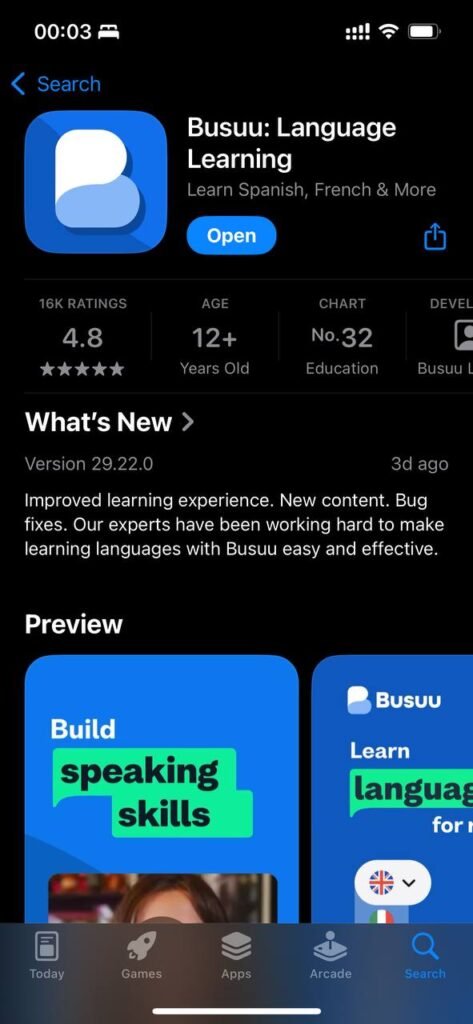
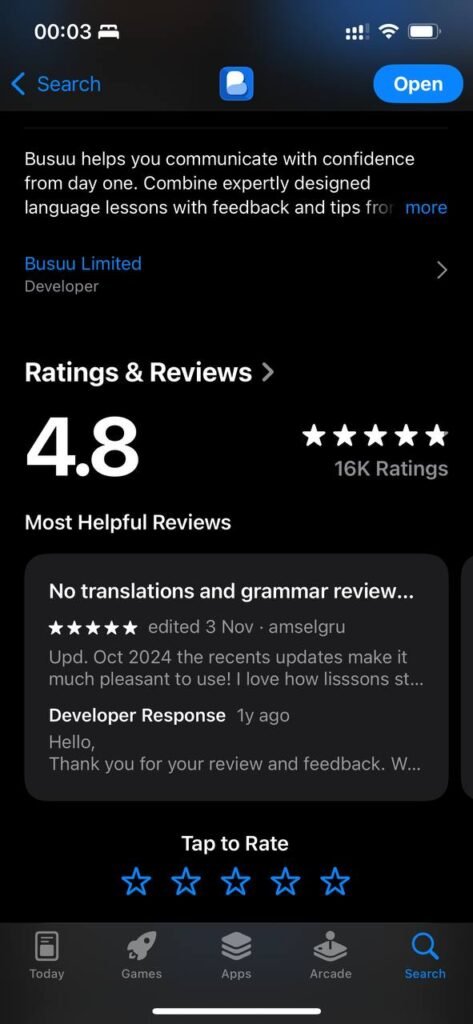
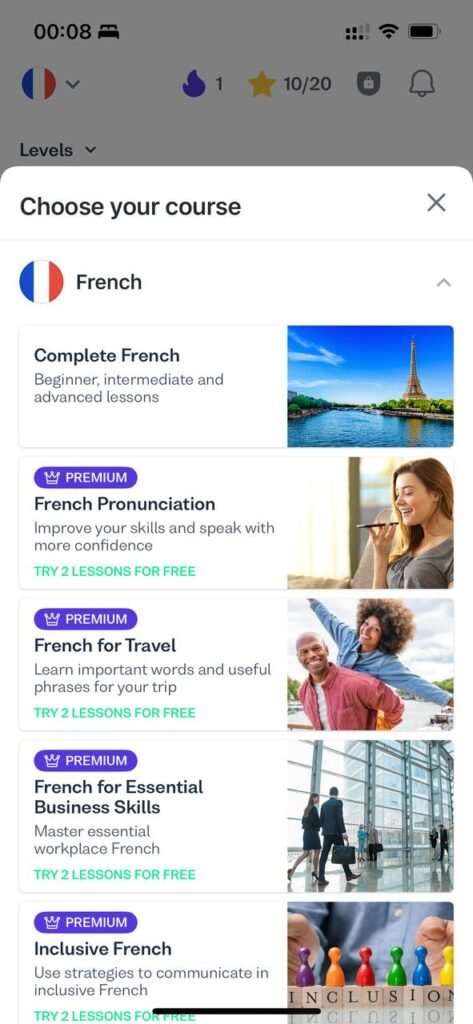
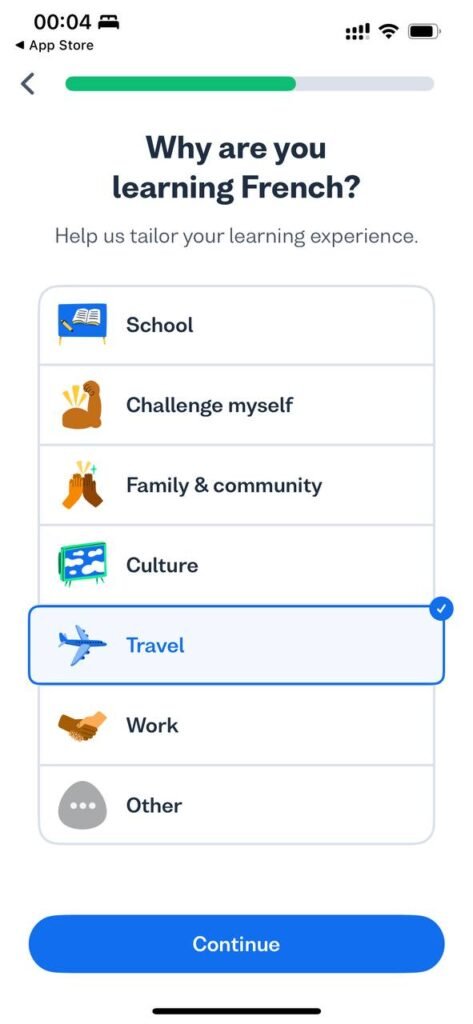
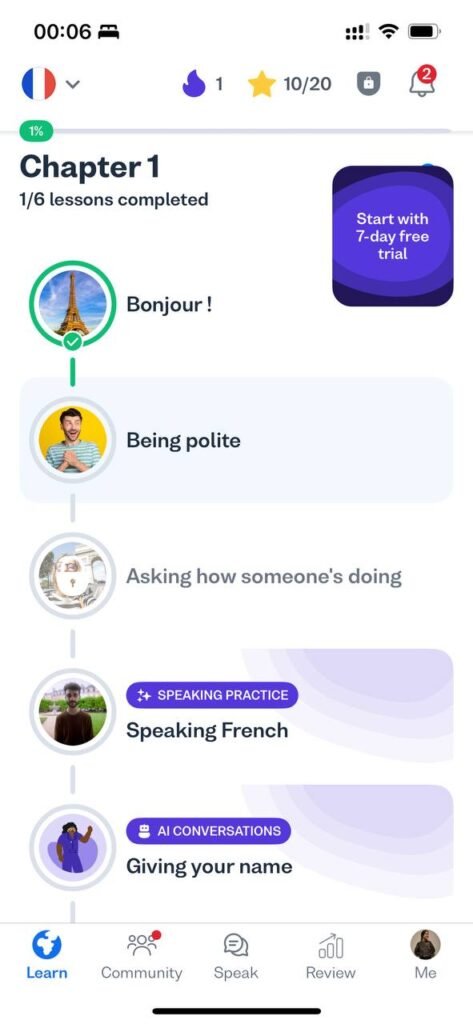
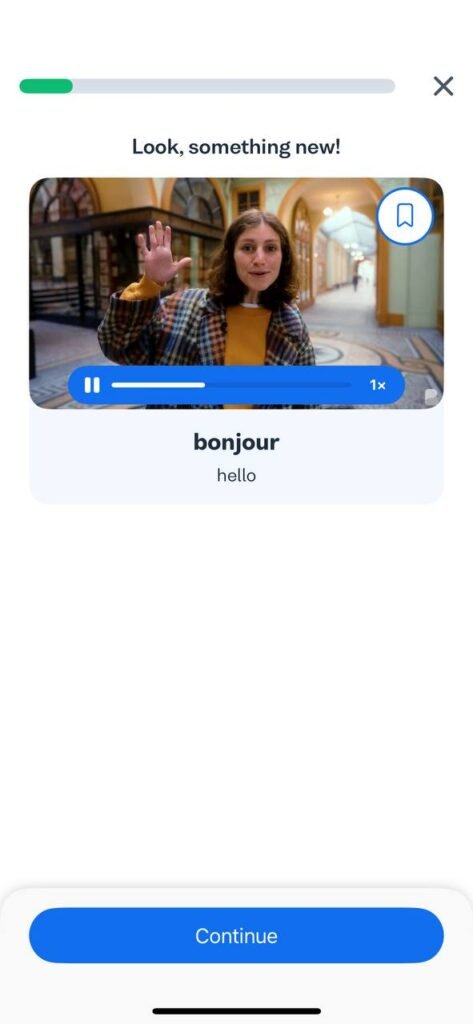
How Busuu Teaches
Busuu uses short, structured lessons organized into CEFR levels. Each lesson includes:
- Vocabulary
- Grammar explanations
- Listening + dialogues
- Pronunciation practice
- Speaking/writing exercises
- Mini quizzes
- Scenario-based tasks (ordering food, introductions, travel, daily life)
You move through the course step-by-step, with a clear progression path.
Speaking & Native-Speaker Feedback
This is Busuu’s signature feature.
You can:
- record your voice
- write full sentences or short texts
- submit real speaking tasks
…and Busuu’s community of native speakers corrects your pronunciation, grammar, and phrasing.
This gives Busuu a level of realism most apps don’t offer, making it especially strong for learners who want to actually use the language in conversation.
Strengths and Weaknesses
Busuu’s strengths: It offers structured CEFR-based courses, native-speaker feedback, strong grammar coverage, and speaking practice that actually improves real communication skills. The personalized study plans and AI conversation tools make learning feel guided and intentional.
Busuu’s weaknesses: The free version is very limited, the app is less gamified than competitors, and some languages—especially Chinese or Japanese—aren’t as deep at advanced levels. It’s strong up to B2, but not ideal for learners wanting C1–C2 mastery.
What Is Babbel?
Languages: Spanish 🇪🇸, French 🇫🇷, German 🇩🇪, Italian 🇮🇹, Portuguese (Brazil) 🇧🇷, Portuguese (Portugal) 🇵🇹, English 🇬🇧🇺🇸, Dutch 🇳🇱, Swedish 🇸🇪, Norwegian 🇳🇴, Danish 🇩🇰, Polish 🇵🇱, Turkish 🇹🇷, Indonesian 🇮🇩, russian 💩
Babbel is a structured language-learning app designed to help users develop practical communication skills through short, focused lessons. Unlike gamified apps, Babbel feels more like a guided mini language course, offering clear grammar explanations, real-life dialogues, and a clean, efficient interface.
It’s ideal for learners who want clarity, structure, and conversational confidence without unnecessary distractions.
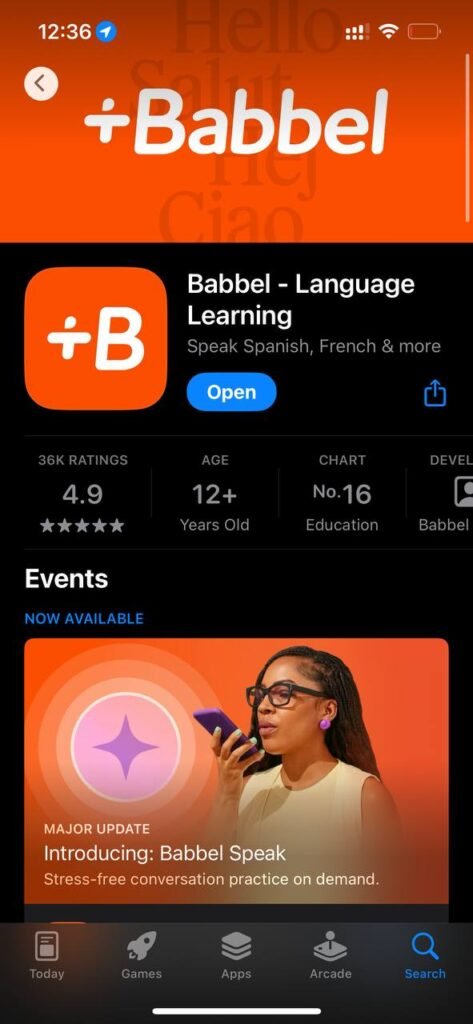
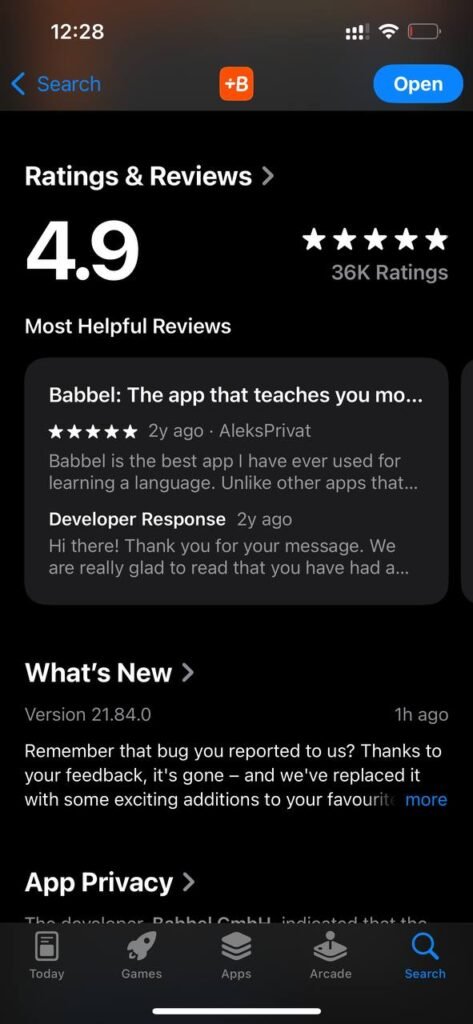
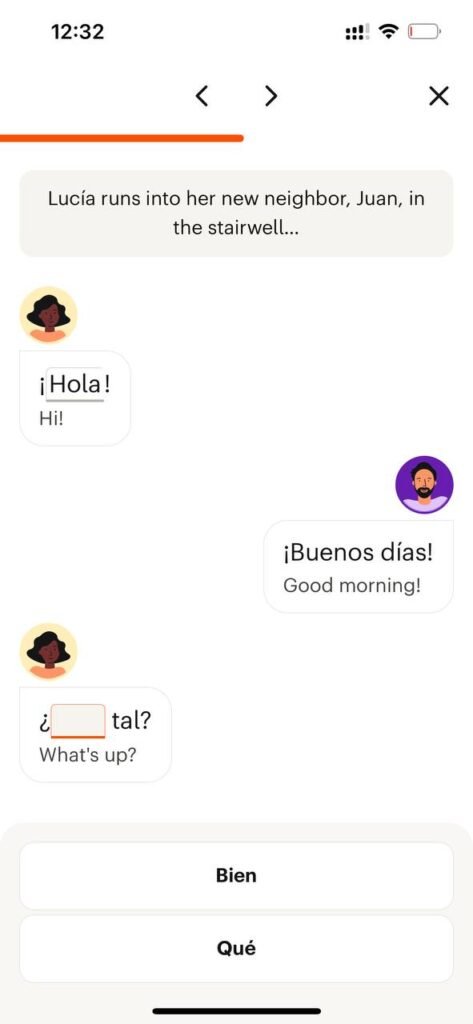
How Babbel Teaches
Babbel lessons are built around real-life situations and practical conversation. Each lesson includes:
- Vocabulary in context
- Grammar explanations
- Listening and comprehension tasks
- Dialogue practice
- Pronunciation exercises using speech recognition
- Short quizzes and reviews
The app is structured so you always understand why a phrase works, not just what it means.
Learning Experience
Babbel is known for being simple, clear, and highly structured. You get:
- Step-by-step lesson paths
- Grammar notes woven into lessons
- Real-life conversational dialogues
- A personalized review system powered by spaced repetition
- Progress tracking across skills
- Optional cultural notes to deepen understanding
It’s a great balance between “serious learning” and “easy to use daily.”
Strengths and Weaknesses
Babbel’s strengths: Excellent grammar explanations, practical dialogues, clean interface, and highly structured lessons that make learning feel predictable and manageable. It’s especially strong for European languages and helps build real everyday communication skills quickly.
Babbel’s weaknesses: It isn’t gamified, the free version is very limited, and it doesn’t offer as many global languages (especially Asian languages). Speaking practice relies on automated recognition, and advanced learners may find the content stops short of higher-level fluency.
Busuu vs Babbel: AI Features Comparison
When it comes to AI, Busuu offers a far more advanced and interactive experience than Babbel. Busuu’s AI tools include conversational simulations that let you practice speaking in real-life scenarios, instant pronunciation scoring, adaptive lesson difficulty, and personalized study plans based on your performance and CEFR goals. Babbel’s AI is more limited, focusing mainly on smart review through spaced repetition and automated pronunciation assessment. While Babbel’s tools support memorization and basic practice, Busuu’s AI actively guides your speaking, adapts your learning path, and helps you build real communication skills.
Babbel AI
- Smart review for spaced repetition
- Automated pronunciation feedback
Useful, but not deep.
Busuu AI
- AI-powered conversation simulations
- Pronunciation scoring
- Adaptive lesson difficulty
- Personalized study plan
- CEFR-based progress insights
Much deeper than Babbel — especially for speaking.
Which One Is Right For You?
Choosing between Babbel and Busuu comes down to how you like to learn. If you prefer clear structure, strong grammar explanations, and quick confidence in everyday conversation, Babbel is the better fit. It’s simple, clean, and ideal for learners who want a no-nonsense path with practical dialogues. Busuu, on the other hand, is perfect if you want a more course-like experience with CEFR levels, native-speaker feedback, and AI-powered speaking practice. It’s the stronger choice for learners who want real communication skills and personal guidance.
In short: pick Babbel for structured clarity, and choose Busuu if speaking confidence and human feedback matter most.
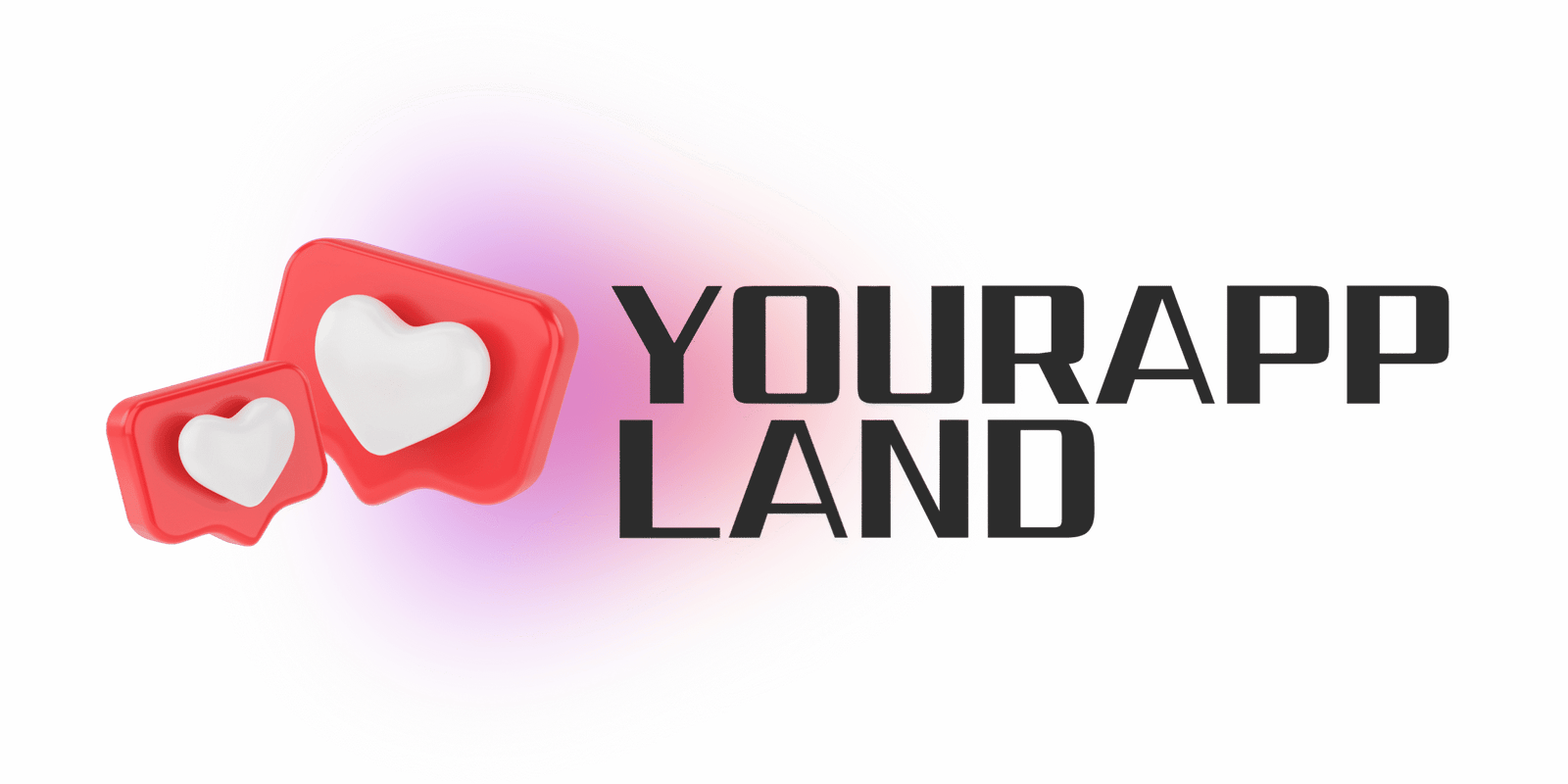
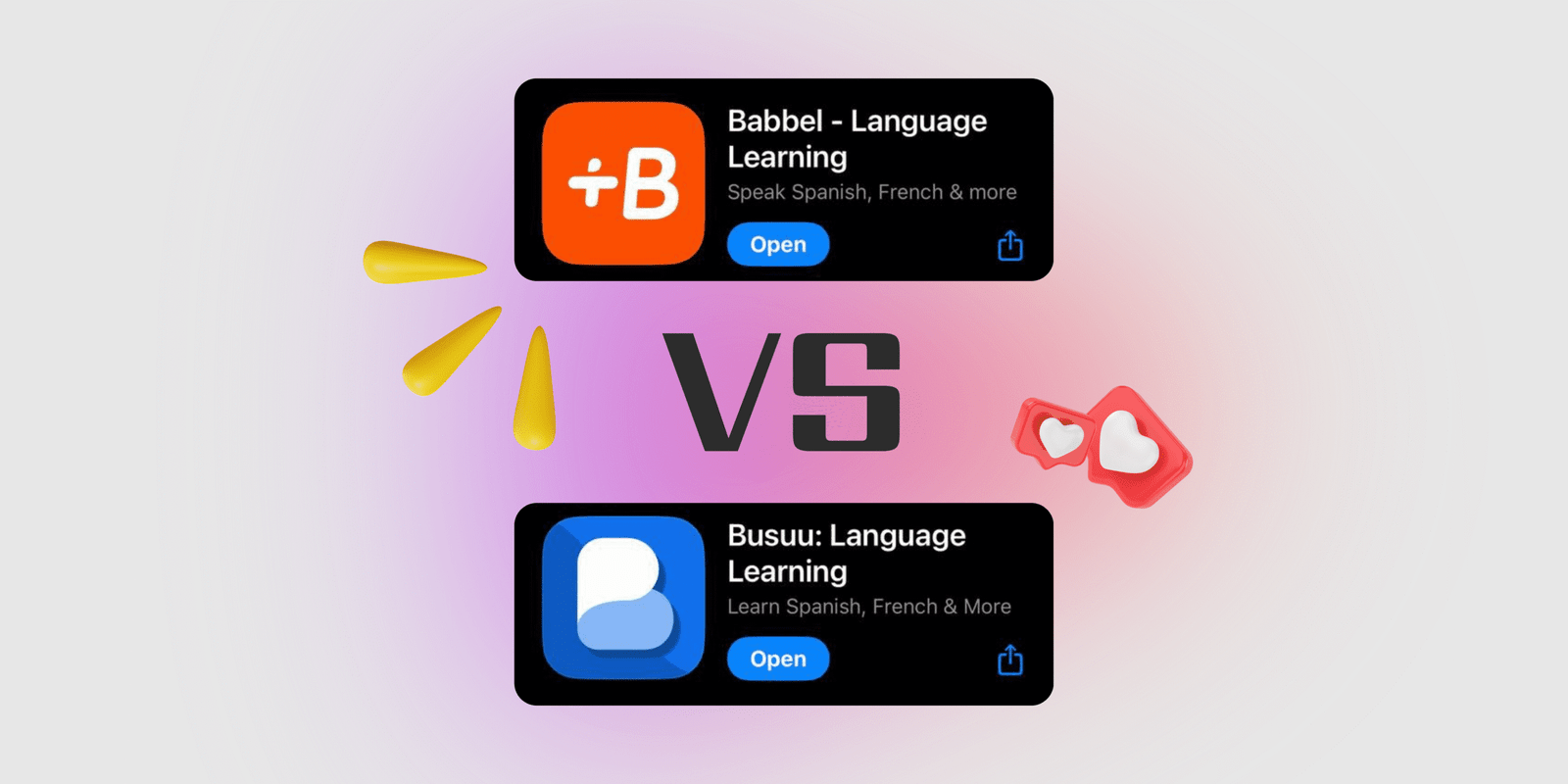
Leave a Reply